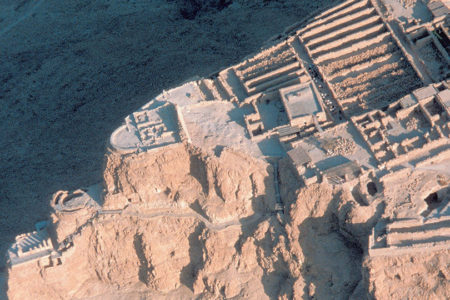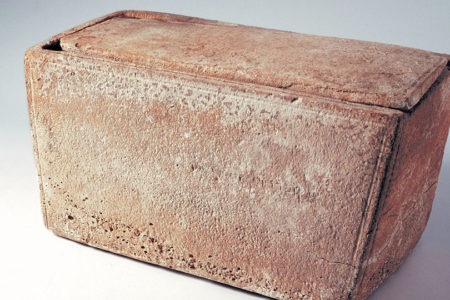Who Is a God Like the Lord!
Micah 7:1-20
Micah’s grief over the deterioration of Judean society is poignantly expressed in this final chapter. The prophet lamented Judah’s sinful condition, knowing that the nation could not go unpunished. In the midst of sorrow, Micah believed God would raise Israel from destruction.
His final message condemns the wicked and comforts the righteous. He assured the people that the Day of Judgment will come, but a brighter day will come as well—a day when God will fully deliver a repentant Israel and fulfill both the physical and spiritual deliverance promised in the Abrahamic Covenant.
Micah’s Confession
Micah used a metaphor to lament the moral breakdown in Judean society. Like a farmer searching in vain for “summer fruits” and “grape gleanings of the vintage” (v. 1), Micah sought in vain for a godly man within Judah. As one who “desired the first-ripe fruit” of the harvest, his soul craved to find an honest man of integrity (v. 1). But again, there was none.
In the midst of his sorrow, Micah lamented,
The good man [godly] is perished [has been swept away] out of the earth, and there is none upright among men; they all lie in wait for blood; they hunt every man his brother with a net (v. 2).
Instead of treating one another with respect and civility, men lay in wait to assault or murder their neighbors, as those who would snare a bird or wild beast.
In verse 3, Micah lamented the breakdown of Judah’s leadership:
They…do evil with both hands earnestly, the prince asketh [demands gifts], and the judge asketh for a reward [a bribe]; and the great [powerful] man, he uttereth [dictates] his mischievous desire; so they weave it together.
These leaders used their positions and power to acquire whatever they desired. Rulers worked within the judicial system to acquire wealth from their countrymen through strong-arm tactics or by skillfully circumventing justice for financial gain—something the law forbade (Ex. 23:8; cf. Dt. 10:17). The “best” of these leaders were “like a brier”; and the “most upright,” pricklier “than a thorn hedge” (v. 4). People who came in contact with them were torn and wounded.
The “watchmen” (prophets) foretold of the time of judgment: “Thy judgment cometh; now shall be their perplexity.” The word now emphasizes that God’s judgment is soon to come; and when it does, Judah’s evil leaders will be thrown into “perplexity” (v. 4). Their confidence will be destroyed and they will become confused and confounded. This judgment fell on Jerusalem during the Babylonian invasion of 586 B.C. It also prophetically foreshadows Jerusalem’s fall in the future Great Tribulation (Zech. 14:1–4).
Micah further lamented the breakdown in both human relationships and family. The common man in the street lacked honesty and integrity in his dealings. The land was satiated with deception, dishonesty, disloyalty, and distortion. No one could be trusted—not a friend, guide, or relative (vv. 5–6). Treachery was so widespread that people had to guard their words, even to their spouses, or their spouses might turn against them.
Micah’s Confidence
In light of this societal deterioration, Micah prayerfully interceded on behalf of his nation. In his prayer, he expressed confidence and hope that the Lord would deliver a righteous Jewish remnant from the midst of injustice and oppression: “I will look unto the LORD; I will wait for the God of my salvation; my God will hear me” (v. 7).
The prophet focused intently on the Lord as though fixated on a watchtower, looking expectantly for God to hear his prayer and eventually bring deliverance and spiritual salvation. He anticipated a future day when God will deliver all Israel from her sin, sorrow, and subjugation. This complete fulfillment will take place after the Great Tribulation, at the Messiah’s Second Coming.
Micah went on to warn Judah’s enemies not to “rejoice,” or gloat, over her judgment and fall (v. 8). Rejoicing was premature. Identifying with Judah, Micah said,
When I fall [face subjugation and captivity], I shall arise; when I sit in darkness [spiritual darkness and affliction], the LORD shall be a light [spiritual light to sustain and deliver a godly remnant in Israel] (v. 8).
Identifying with the sin of his people, Micah confessed, “I will bear the indignation of the LORD, because I have sinned against him” (v. 9). It is God’s indignation and wrath poured out on Judah that will eventually bring the nation back to the Lord. Micah was confident that Jehovah would “plead” their cause—that He would take their part, as in a court of law, and “execute judgment” for them (v. 9). The prophet expected God to bring to light all the injustices perpetrated against the Jewish people throughout history. Then Judah will witness God’s righteousness in repaying the nations for their anti-Semitic acts when He rights the wrongs she has suffered throughout the centuries.
Judah’s “enemy” had asked, “Where is the LORD, thy God?” (v. 10). These nations blasphemed God, implying that Jehovah had abandoned Judah because He was unable to deliver her. The nations who taunted Judah and her God, holding both in derision, will be put to shame and “trampled down like the mire [mud] of the streets” (v. 10). Israel’s enemies will be totally destroyed by the Messiah at His Second Coming (Ps. 2:1–3; Rev. 19:11—20:3).
The prophet announced that Judah and Jerusalem would be restored: “In the day that thy [Jerusalem’s] walls are to be built, in that day shall the decree be far removed” (v. 11). The word decree is better translated by the Hebrew phrase on that day will your boundaries be extended. This prophecy was partially fulfilled after the Babylonian Captivity, when Jerusalem’s walls were rebuilt. Its ultimate fulfillment will be during the Millennial Kingdom, when Jerusalem will be rebuilt, be expanded, and become the capital of the world.
Micah continued:
In that day also he shall come even to thee [Jerusalem] from Assyria, and from the fortified cities [city of Egypt], and from the fortress [also Egypt] even to the river [Euphrates], and from sea to sea, and from mountain to mountain (v. 12; cf. Isa. 19:23–25).
This verse refers to nations coming from around the world to worship in Jerusalem during the Millennial Kingdom (cf. Mic. 4:2). Until then, both Israel and the world “shall be desolate” (v. 13) because God’s wrath will be poured out on the earth during the Great Tribulation.
Micah’s Call
Micah called on Jehovah to care once again for His people like a shepherd: “Feed thy people with thy rod, the flock of thine heritage . . . as in the days of old” (v. 14). The “flock of thine heritage” refers to Israel’s covenant relationship with God as His special possession. Israel will be restored and ruled by the Messiah, who will be her Shepherd during the Millennium.
Then Judah will no longer be scattered throughout the nations but will dwell in her own land, as verse 14 expresses by citing the areas of Carmel, Bashan, and Gilead. In that day, Israel will be separated from the nations, live in safety, and enjoy the land promised her in the Abrahamic Covenant. Verse 15 reveals that the Lord will perform many miracles in reestablishing Israel in her land, as He did when He delivered the nation from Egyptian captivity.
As a result of these future miracles, the Gentile nations will be “confounded at all their [Israel’s] might” (v. 16). The nations will become awestruck, ashamed, and alarmed at Israel’s strength when God delivers her. They also will become powerless, humiliated, degraded, and disgraced. So they will “lay their hand upon their mouth; their ears shall be deaf” (v. 16). Thus Israel’s enemies will become speechless, no longer mocking Israel and her God or closing their ears so they would not hear of the nation’s victory.
In pictorial words, Micah said, “They shall lick the dust like a serpent; they shall move out of their holes like worms of the earth; they shall be afraid of the LORD, our God, and shall fear because of thee” (v. 17). In terror the nations will acknowledge and revere the Lord and prostrate themselves fearfully before Him in repentance because of His bond with Israel.
Micah’s Celebration
Micah was overcome with the Lord’s goodness and mercy. In the closing verses, the prophet celebrated the greatness of Jehovah. He praised the Lord by using a play on words relating to his own name: “Who is a God like unto thee…?”(v.18). Micah’s name means “Who is like the LORD?” Moses uttered the same words after God delivered Israel through the Red Sea (Ex. 15:11). Obviously, there is no other God but Jehovah; and nothing mankind worships compares to the Lord in the way He pardons sin and brings forgiveness and deliverance to Israel.
In the closing verses of his book, Micah’s heart expressed deep gratitude to God as he gloried in the Lord’s future deliverance of Israel. The prophet mentioned eight truths about God’s love toward His Chosen People Israel: u The Lord “pardoneth iniquity, and passeth by the transgression [rebellious acts] of the remnant of his heritage” (v. 18). The reference is to a remnant of Jewish people who will be protected through the Great Tribulation and saved to enter the Millennial Kingdom (Zech. 12:10; 13:9; Rom. 11:26).
- The Lord “retaineth not his anger forever” (v. 18). He is ready to show grace to the repentant. u The Lord “delighteth in mercy [loving kindness]” (v. 18). He is ready to show compassion and forgiveness.
- The Lord “will turn again” (v. 19). He is always ready to dispense His mercy and compassion on Israel. u The Lord “will have compassion upon us” (v. 19). He has tender, heartfelt concern for Israel.
- The Lord “will subdue [tread underfoot] our iniquities” (v. 19), rendering sin powerless and inoperative, as one would an enemy.
- The Lord will “cast all their sins into the depths of the sea” (v. 19), indicating a final end to an individual’s sin, whereupon God forgives and forgets it. Interestingly, Jewish people quote verses 18–19 on Rosh Hashanah (Jewish New Year) when they recite this prayer of repentance in a service called
- The Lord will “perform the truth [be faithful] to Jacob, and the mercy [lovingkindness] to Abraham, which thou hast sworn unto our fathers from the days of old” (v. 20). Micah closed with these words that confirm the Lord will keep His promises to Israel, which He made to her forefathers in the unconditional Abrahamic Covenant.
These promises to Abraham are immutable because they were confirmed by God’s sworn oath (Heb. 6:13–18). And they stand in perpetuity to the Jewish people as a source of comfort and hope to Israel today. After reading what God has done for Israel, we, too, can say, “Who is a God like the LORD!”







